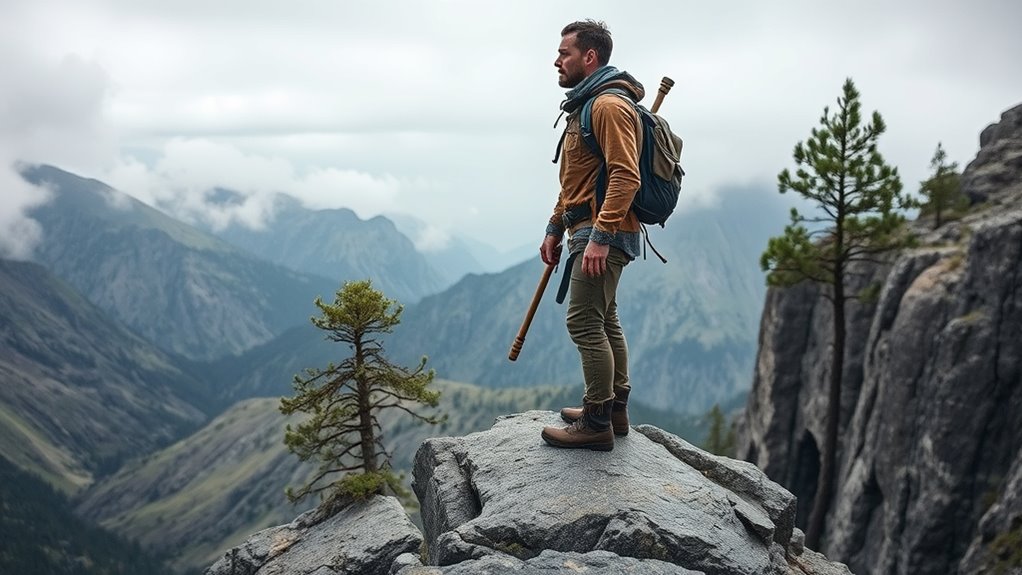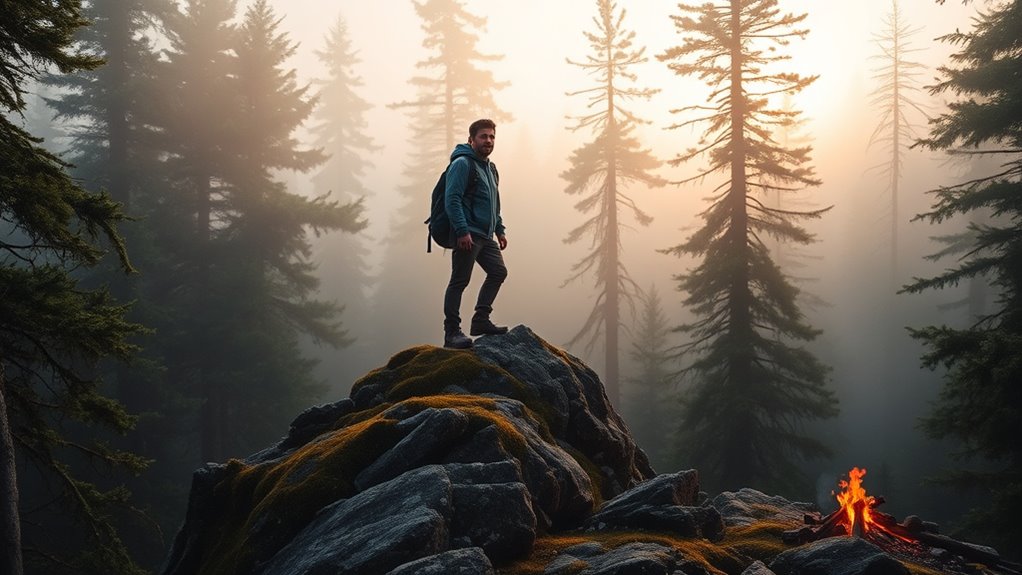Surviving alone in the wilderness tests your mental resilience and emotional stability. You’ll face challenges like loneliness, fear, and anxiety that can amplify without distraction. To succeed, focus on mindfulness, emotional regulation, and setting realistic goals. Developing confidence through preparation, practicing self-reflection, and finding purpose keeps your mind strong. Staying present, managing stress, and fostering positive thinking help you adapt, grow, and stay motivated. Keep exploring these strategies to better understand how to overcome mental hurdles in solitude.
Key Takeaways
- Managing fear and anxiety through mindfulness, breathing, and positive reframing maintains emotional stability during solitude.
- Building resilience involves setting small goals, practicing self-care, and reflecting on past experiences to enhance mental toughness.
- Staying present with mindfulness and sensory awareness helps prevent overwhelm and improves decision-making.
- Regular self-reflection and purpose-driven activities like journaling foster motivation and emotional resilience.
- Recognizing and regulating emotions, cultivating gratitude, and focusing on nature connection strengthen mental well-being in isolation.
Understanding the Mental Challenges of Solo Wilderness Adventures

Beginning a solo wilderness adventure can be as mentally demanding as it is physically challenging. You’ll find yourself deepening your nature connection, which can bring both peace and vulnerability. Spending time alone in the wild often leads to solitude reflection, forcing you to confront your thoughts without distractions. This mental space can be enlightening, but it also risks amplifying feelings of loneliness or anxiety. The silence and isolation challenge your ability to stay centered, demanding resilience and emotional strength. You might discover hidden fears or doubts, but recognizing these mental hurdles is the first step toward overcoming them. Embracing solitude reflection helps you build self-awareness, turning a potential vulnerability into a source of inner growth during your wilderness journey. A strong understanding of your own mental resilience can significantly influence how well you adapt to and thrive in such solitary conditions. Developing mindfulness practices can aid in maintaining emotional balance and focus in challenging moments.
Cultivating Resilience and Mental Toughness

Developing resilience and mental toughness is essential for enduring the unpredictable challenges of solo wilderness adventures. While you’re alone, maintaining a sense of social connection, even mentally, can strengthen your resolve. Reflect on past group cohesion experiences, remembering how working with others built your confidence and perseverance. Cultivating mental toughness means pushing through setbacks and staying focused on your goals despite adversity. You can do this by setting small, achievable targets, fostering a positive mindset, and practicing self-discipline. Recognize that resilience isn’t just about surviving; it’s about adapting and growing stronger. Strengthening your mental resilience prepares you to face tough situations head-on, helping you stay calm, resourceful, and motivated in the face of isolation and uncertainty. Incorporating emotional regulation techniques can further enhance your ability to manage stress and maintain focus during difficult moments. Additionally, practicing mindfulness can improve your awareness of physical sensations and emotional responses, which is vital for maintaining mental clarity. Building cognitive flexibility can help you adapt your strategies when faced with unexpected obstacles. Incorporating self-care routines, such as proper nutrition and rest, also plays a crucial role in sustaining your mental stamina. Additionally, understanding the importance of payment processing in managing financial resources can provide peace of mind, ensuring your safety and security during extended solitude.
The Role of Mindfulness and Emotional Regulation

Staying present helps you stay grounded when you’re alone, making it easier to handle challenges calmly. Managing your emotional responses prevents feelings from overwhelming you and clouding your judgment. Practicing mindfulness empowers you to respond thoughtfully rather than react impulsively. Being aware of AI vulnerabilities and maintaining a cautious mindset can also help you adapt to unexpected situations effectively. Incorporating evidence-based psychological research into your mental strategies further strengthens your resilience in solitude. Additionally, understanding how creative practice fosters problem-solving skills can provide innovative approaches to managing stress and uncertainty during challenging times. Recognizing potential security vulnerabilities in your environment allows you to implement safer strategies for survival.
Maintaining Present-Moment Focus
Practicing mindfulness helps you stay anchored in the present moment, which is essential when you’re steering through life alone. To sharpen your focus, incorporate simple mindfulness exercises like breath awareness or body scans. Developing emotional awareness allows you to recognize feelings without judgment, preventing distraction. Here are four strategies:
- Engage in regular mindfulness exercises to strengthen your attention.
- Use deep breathing to calm the mind during stressful moments.
- Observe your surroundings deliberately to enhance sensory awareness.
- Practice non-judgmental acceptance of your emotions to maintain clarity. Additionally, understanding the importance of sound healing science can motivate you to prepare effectively for various situations, as the therapeutic use of essential oils can support emotional regulation and mental clarity, with research suggesting that pressure relief techniques can also play a vital role in emotional stability.
Managing Emotional Responses
Managing emotional responses becomes easier when you leverage mindfulness techniques that help you observe your feelings without immediate reaction. By staying present and acknowledging your emotions, you build emotional resilience, which strengthens your ability to handle stress in survival situations. Instead of reacting impulsively to fear or frustration, use mindful awareness to assess your feelings objectively. This practice allows you to regulate your emotions effectively, preventing panic and maintaining focus. Consistent stress management through mindfulness enhances your mental clarity and decision-making under pressure. Remember, emotional regulation isn’t about suppressing feelings but understanding and managing them constructively. Developing an understanding of emotional responses further supports your ability to stay calm under pressure. Incorporating stress management techniques such as breathing exercises can significantly improve your resilience in high-pressure environments. Being aware of air quality and its impact on mental clarity can help you make better decisions in stressful wilderness situations. Recognizing the importance of mental resilience allows you to better adapt to unexpected challenges and setbacks. Additionally, understanding mindfulness practices can further aid in maintaining a composed and strategic mindset during emergencies. With patience and practice, you’ll develop greater control over your emotional responses, increasing your chances of survival and maintaining a calm, strategic mindset in challenging wilderness conditions.
Strategies for Managing Fear and Anxiety

Have you ever felt overwhelmed by fear or anxiety when you’re alone? It’s natural, but managing these emotions is vital for survival. Here are four effective strategies:
- Practice meditation techniques to center your mind and reduce stress.
- Use controlled breathing exercises to calm your nervous system and regain focus.
- Reframe negative thoughts by focusing on your resources and strengths.
- Create a routine to bring structure and stability during uncertain moments.
- Engage with mindfulness practices to enhance your emotional resilience and stay present during stressful situations. Developing psychological resilience can significantly improve your ability to cope with challenging environments and maintain a positive outlook.
These approaches help you stay grounded, even in the face of fear. Meditation techniques and breathing exercises are especially powerful tools, enabling you to control your emotional response and maintain clarity. Consistently applying these strategies enhances your resilience, ensuring you can face challenges with a calmer mind.
Building Confidence Through Preparedness and Knowledge

When you’re prepared and knowledgeable about your environment, your confidence grows naturally, empowering you to handle challenges more effectively. Selecting the right gear is essential; choose reliable equipment suited for your specific surroundings, and practice using it beforehand. This familiarity minimizes uncertainty during emergencies. Developing strong navigation skills also boosts confidence, allowing you to find your way even in unfamiliar terrain. Learn how to read maps, use a compass, and recognize natural landmarks. The more you understand your environment and master practical skills, the less intimidating solo survival becomes. Confidence isn’t just about feeling good; it’s built through real competence. When you trust your gear and navigation abilities, you’re better equipped to adapt, stay calm, and make smart decisions in the wilderness. Incorporating Volkswagen Tuning into your outdoor setup can also create a more sustainable and self-sufficient environment, reinforcing your confidence in managing your space.
Maintaining Focus and Clarity in Isolation

Maintaining focus and clarity in isolation can be challenging, but staying mentally sharp is essential for your safety and well-being. To do this effectively, consider these strategies:
- Practice visualization techniques to mentally simulate successful actions and stay motivated.
- Enhance sensory awareness by consciously observing sounds, smells, textures, and sights around you.
- Set small, achievable goals to maintain a sense of progress and purpose.
- Take regular breaks to reset your mind, avoiding mental fatigue.
These methods help anchor you in the present, preventing distraction and panic. By sharpening your focus and clarifying your thoughts, you’ll improve decision-making, conserve energy, and increase your chances of survival in the wilderness.
Developing a Positive Mindset in Adverse Conditions

When facing tough conditions alone, it’s essential to focus on cultivating optimism every day. Managing negative thoughts helps you stay resilient and keeps your mindset strong. By intentionally shifting your focus, you can build a more positive outlook even in adverse situations.
Cultivating Optimism Daily
Even in the toughest times, cultivating optimism can be a powerful way to stay resilient. To maintain a positive mindset, focus on small daily habits that reinforce hope and strength.
- Connect with nature regularly—observe the beauty around you to foster a sense of wonder.
- Practice gratitude—acknowledge even minor blessings to shift your perspective.
- Visualize positive outcomes—imagine successful survival scenarios to build confidence.
- Set achievable goals each day—small wins boost morale and reinforce your resilience.
Managing Negative Thoughts
Cultivating optimism helps you stay grounded during tough times, but negative thoughts can still creep in and threaten your mindset. When negative self-talk arises, recognize it as a natural response to stress. Instead of letting it spiral, practice cognitive reframing—challenge those thoughts and replace them with more realistic, positive perspectives. For example, if you think, “I can’t do this,” reframe it to, “I’ve handled tough situations before, and I can manage this too.” This shift helps you regain control and maintain focus. Managing negative thoughts isn’t about suppressing them but about actively transforming them. By staying aware and practicing cognitive reframing, you build resilience and foster a more constructive outlook, essential for surviving solo in the wilderness.
The Importance of Self-Reflection and Adaptability

Self-reflection and adaptability are crucial skills for surviving alone because they enable you to recognize your strengths and weaknesses while adjusting to new challenges. When you practice self-awareness, you gain clarity on your mental and physical state, helping you make better decisions. Adaptive thinking allows you to modify your strategies in real-time, essential when plans go awry. To cultivate these skills, consider:
- Regularly assess your emotional and physical health.
- Analyze past successes and failures to improve your approach.
- Stay open-minded to new solutions and ideas.
- Practice mindfulness to stay present and aware of your environment.
Mastering these aspects enhances resilience and increases your chances of survival, ensuring you remain flexible and focused amid unpredictable wilderness conditions.
Creating a Sense of Purpose and Motivation

Building a strong sense of purpose and motivation can considerably boost your resilience when you’re alone in challenging environments. One effective method is mountain meditation, which helps you center your thoughts and clarify your goals. Taking time to focus on your breath and surroundings reinforces your mental strength. Additionally, wilderness journaling allows you to track your progress, reflect on your experiences, and remind yourself of your purpose. Writing about your reasons for surviving keeps your motivation high, especially during tough moments. Both practices foster a deeper connection to your environment and yourself, anchoring your mindset in purpose. When you actively cultivate this sense of meaning, you’re better equipped to face obstacles with resilience and confidence.
Frequently Asked Questions
How Does Solitude Affect Long-Term Mental Health During Wilderness Survival?
Solitude during wilderness survival can profoundly impact your long-term mental health. Without social interaction, you might face increased social isolation, which challenges your emotional resilience. This isolation can lead to feelings of loneliness and depression if prolonged. However, if you develop strong coping strategies, like maintaining routines or practicing mindfulness, you can bolster your emotional resilience and mitigate negative effects, helping you stay mentally healthy during extended periods alone.
What Are Effective Ways to Prevent Loneliness From Impacting Decision-Making?
Loneliness can lull your logic, leading to poor choices. To prevent this, focus on fostering feelings of connection through group activities, even if solo, like talking to yourself or recording thoughts. Practice emotional regulation by staying calm and mindful, which sharpens decision-making. Maintaining routines, visualizing loved ones, and staying engaged helps combat loneliness’s impact, ensuring you stay alert, aware, and able to make sound decisions in solitude.
How Can One Differentiate Between Natural Fear and Panic in Survival Situations?
To differentiate between natural fear and panic, focus on panic recognition and fear differentiation. Natural fear keeps you alert and helps you react carefully, while panic causes rapid, irrational decisions. If your thoughts become uncontrollable and your actions frantic, you’re likely experiencing panic. Stay calm, breathe deeply, and assess your situation logically. Recognizing these signs allows you to regain control, making better choices and staying safe in survival situations.
What Role Does Physical Fitness Play in Mental Resilience Alone?
Think of your mind and body as a tightrope walker—balance is key. Physical fitness enhances your mental resilience by strengthening that mind-body connection, making you more adaptable under stress. When you build your physical endurance, you train yourself to stay calm and focused, even in tough moments. So, staying fit isn’t just about strength; it’s about sharpening your mental edge, helping you face wilderness challenges with confidence and clarity.
How Do Cultural Backgrounds Influence Solo Survival Psychology?
You might not realize it, but your cultural background shapes how you approach solo survival. Cultural resilience and belief systems influence your mindset, helping you stay calm or feel overwhelmed in tough situations. If your background emphasizes independence and resourcefulness, you’re more likely to stay positive and adaptable. Recognizing these influences can boost your mental strength, allowing you to draw on deep-seated beliefs to navigate challenges confidently and maintain resilience in isolation.
Conclusion
Ultimately, your journey into solo wilderness survival is a quiet dance with the shadows of doubt and the whispers of resilience. Embrace each challenge as a gentle teacher, guiding you toward inner strength and clarity. With patience and self-compassion, you’ll find that even in solitude, you can cultivate a quiet confidence, turning the wilderness’s silent lessons into a profound symphony of growth. Trust in yourself—you’re more prepared than you realize.










